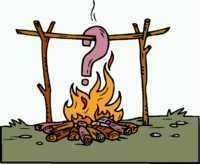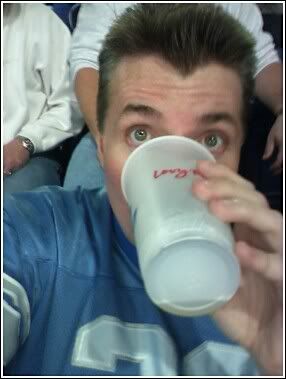Answering the Detroit Tigers' "Burning questions," volume 11
 Do you know what time it is? No, it's not time for me to bitch about the Lions. It's not time for me to make some lame 70's pop culture reference. It's not the time on TWFE when we dance...
Do you know what time it is? No, it's not time for me to bitch about the Lions. It's not time for me to make some lame 70's pop culture reference. It's not the time on TWFE when we dance...
What it is time for is the 11th round of me answering Detroit News columnist Lynn Henning's Burning questions!
In this edition, it's all Jim Leyland, all the time. How anyone could seriously take umbrage with the Marlboro Man is beyond me, but Henning does his best in coming up with devil's advocate style questions On with the smoky inquisition, and let's take down those strawman arguments!
Burning questions after the Tigers finally got dismissed from the playoff race
Q: So what grade does Jim Leyland get as manager in 2007?
Henning: The same grade his team gets: We'll give them a collective B.
Big Al: Sounds about right to me. He's going to finish in 2nd in the central, and a few games out of the wild card. Considering the overall circumstances, I doubt he could have gotten much more out of this Tigers team.
Q: How can you reward failure? They didn't make the playoffs? They were outhit, outpitched, outmanaged, outmarketed, outadministered, and outownered by the Cleveland Indians. Leyland and his players should be ashamed.
Henning: You're right. They need to study 2006 and do the things they did when they were all geniuses. Making sure to tell Kenny Rogers not to get hurt would be wise in that respect. The same advice should be given to Joel Zumaya and Gary Sheffield.
Big Al: I'll put it this way. Jim Leyland didn't become a crappy manager over the off season. He's the same guy, using the same basic strategy, as he was in 2006.
Leyland's a great manager, perhaps the best in all of baseball. Much like any head coach or manager in any sport, Leyland didn't deserve all the accolades he received in 2006, and he dosen't deserve much of the criticism some showered upon him in 2007. You're only as good as you players, and between injuries, decline, suckage, and plain old bad luck, the Tigers weren't as good in '07 as they were in in '06.
For example, the fact Brandon Inge went from a dangerous number 9 hitter to an offensive back hole in a 12 month period, was no fault of Leyland's.
Q: You're using injuries as an excuse. This team and this manager failed. Failed! You thought Leyland did a good job this year?
Henning: I didn't see him do anything different than he did in 2006. At some point, the players and their health levels enter into the equation -- like to the tune of about 96 percent. Do you think Eric Wedge of the Indians did anything noticeably different this year in terms of administration and strategy than he did last year, when the Indians were 78-84?
I'll tell you what he did differently: He watched Fausto Carmona turn into a machine in the starting rotation and Rafael Betancourt preserve him from the consequences of a mediocre closer in Joe Borowski. He did a good job, too, in allowing his general manager, Mark Shapiro, to find a new second baseman in Asdrubal Cabrera after Josh Barfield flamed out.
Wedge has been a solid manager. This year, he had more solid players. The Tigers were too banged up to overcome a better Indians team. But the reason wasn't Leyland.
Big Al: I'll ask you this. Who would you rather have running your team, Wedge or Leyland? I bet EVERY team in MLB would say Jim Leyland. I bet every team in MLB would take Jim Leyland over whomever they currently have running their teams, no ifs, ands or buts about it.
In regard to Wedge, it's amazing how much better a manager he became when his players performed up to their capabilities. Hell, the fans in Cleveland were ready to run Wedge out of town on a rail after the Indians underachieved last season. This season, he could be elected governor.
As for this year's Tigers, a combination of Sparky Anderson, Casey Stengel, the kid who ran the Twins in "Little Big League," Lou Brown, and Tony LaRussa's brain in a pickle jar would have had trouble overcoming all the Tigers' injuries this season. The Tigers were in the hunt till the last 2 weeks of the season, while using a makeshift lineup for the vast majority of the year. I think that's testament to Leyland's ability.
How do you think an in over his head clown like Luis Pujols would have done? Or an inexperienced Alan Trammell? The Tigers would have given up weeks, if not months, ago.
Q: You're giving the manager a pass. Did you see some of those lineups he put out there? Did you see some of those pitching changes?
Henning: Sure, and I didn't have many problems on many days, except for some of the same subjective differences that you're always going to have with any manager over a 162-game season.
Big Al: I disagreed with some of the Marlboro Man's lineups as well. Unfortunately, the same basic strategies that worked in 2006 didn't work quite as well in 2007. I'd blame that more on the players, than the manager.
It's not as if we are going to see anything different in how Leyland runs his team in 2008. He'll be the same manager he was the past 2 seasons, and I'll wager that he'll have the Tigers, once again, in contention all season as well.
Q: But did you see some of those batting orders?
Henning: You're talking about days when Mike Rabelo was in the lineup for Pudge Rodriguez and when someone such as Ramon Santiago was playing shortstop and Mike Hessman was playing third base or first base.
Funny how many people have told me that Santiago needs to be the regular shortstop in 2008; that Hessman should be the regular third baseman; and that Rabelo is definitely a better catcher than Rodriguez.
Everybody's got an opinion on the roster, batting order, lineup, and on the issue of pitching changes in a particular game.
The only thing that makes any difference is, at the end of the day, if your team has won. If so, a fan's second-guesses become muted or they are forgotten altogether. If they lose -- and losing probably occurred for reasons having to do with player performances -- then those managerial bones of contention become federal cases.
Big Al: Do I have issues with batting Sean Casey 3rd when Sheffield was hurt? Or batting Marcus Thames in the 2 hole when Placido Polando is out? Sure, and most everyone else does, too. But you can't argue with 95 wins last season, and what will probably be close to 90 this season. Leyland has his reasoning for his sometimes odd batting orders (He doesn't like to move players out of their "Comfort zone," thus Carlos Guillen hitting 5th all season rather than being shuffled around when injuries hit), and he's not going to change now.
You can't expect Leyland to play older players with injury histories like Magglio Ordonez, Pudge Rodriguez, and Gary Sheffield 162 games. You just can't play them every day, even in September. You have bench players for a reason. You just have to try and place them in situations where they have the best chance to be successful. For the most part, Leyland does just that.
And anyone who says Mike Hessman or Mike Rabelo should be playing regularly needs to have their heads examined.
Q: But why rest your stars in important games?
Henning: The manager is on the record as saying these words: I manage for the season, not for one game. Experience has taught him -- and all big league managers worth a hoot -- that you absolutely must rest some regulars more than others during the course of a season.
If you don't, you will likely pay a steep price in September. The one thing you can't say about the Tigers during the past few weeks is that they wore down. Rodriguez looked as fresh as he did in June or July, which is saying something for a catcher who is almost 36 years old.
I can hear it now had Leyland gone 150 or more games with his everyday regulars: The manager burned them out. He wore them down. He treated them like machines. No wonder they got swept by the Indians.
Big Al: I agree with much of what Henning said. Most players aren't robots, Cal Ripken, of Lou Gehrig. They need to sit for various reasons. Health, rest, slumps, injury, past history with a specific pitcher.
For that matter, sometimes you need those bench players to produce in tight, important situations throughout a season. I wouldn't expect a player to come off the bench, after sitting for weeks, and be able to help you win a game. There have been games that were won in thanks to big contributions of bench players like Thames, Mike Rabelo, and Ryan Raburn.
Leyland knows when to ride those guys, and when to ease off on their use, to prevent them from being exposed.
One more thing. When you look at the 2007 Indians, you'll see Eric Wedge is going to have played his lineup's big 5 (Martinez, Blake, Peralta, Sizemore, and Hafner) at least 145 games. That just might come back to haunt them in 2008.
Q: But what about pitching changes? Bunting and baserunning? Undisciplined hitting? Bad bullpen performances? You're saying the manager bears no accountability there?
Henning: The manager does not pitch or hit. He oversees the players who perform and whose skills will determine 99 percent of games and their outcomes.
If Leyland were doing a bad job of managing, it would be acknowledged as such across the board. But ask any opposing manager where Leyland sits on the list of guys they most hate to manage against.
He finishes in the top two or three on anyone's ballot, and No. 1 with most of his colleagues. He managed thousands of games in the minor leagues and has now managed 2,500 in the big leagues.
If you're looking at Leyland as the Tigers' problem in 2007, we weren't watching the same games.
Big Al: From the looks of the question, it's obvious Henning has been reading the message boards!
First off, I agree with Leyland's baseball strategy the vast majority of the time. He's loath to use small ball, unless absolutely necessary. He rarely gives up an out by bunting. Leyland is more from the Earl Weaver school of baseball, that your best weapon is the 3 run homer. He'll often let a starting pitcher try to pitch out of their own jams. He's not afraid to be unorthodox, and buck conventional baseball wisdom, such as visiting the mound, or even pulling a pitcher, in the middle of a count. Leyland's seen it all, and done it all.
Leyland knows exactly what he is doing when he reams a player, or the team as a whole. He's not going to go off half cocked, and alienate his players by doing or saying something stupid that could easily come back to haunt him. Leyland has a legitimate reason behind all his actions, and everything he says. He's aware of the consequences if he makes a bad move, or says the wrong thing.
After years of questionable, and at time outright awful, managing, I really can't see anyone in their right mind thinking the Tigers would be able to find a better manager than Jim Leyland.










My only issue with Jim L. is that he sometimes seems to pull pitchers a moment too early. Maybe it's just bad luck, or maybe I think it's happening more than it is, but it seems that he'll pull a pitcher, and the reliever *immediately* gives up a run or three.
ReplyDeleteI think one of their biggest problems this year has been wildness on the mound. Too many wild pitches and far, far too many lead-off hitters drawing walks.
Again, it's about the players, but they need to work on that. Although I guess it's partly a matter of maturity.
We'll get 'em next year. Especially once they sign A-Rod.